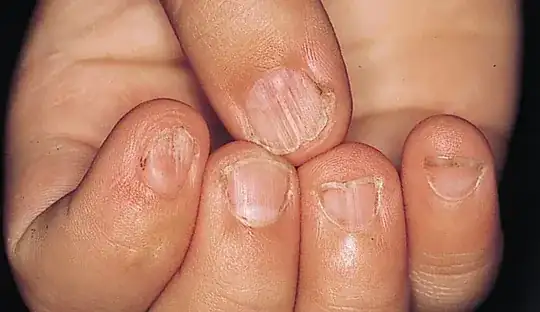I've seen on a lot of websites that nail-biting behaviour is due to lack of iron in the blood. I'm wondering if is this actually true, or just an urban myth which has spread and spread?
-
2Can you provide a link to one that makes such a claim? – fred May 19 '11 at 17:57
2 Answers
There are two manifestations of iron deficiency that could explain this claim: koilonychia and pica.
Koilonychia or "spoon nails" is when the nail becomes concave. It can be a classic sign of iron deficiency on physical exam.* The nails of iron-deficient patients may also become brittle and/or split lengthwise.

Some form of pica is present in about half of cases of iron deficiency. It describes a broad range of eating disorders, often associated with mineral deficiencies, where a person will compulsively eat or chew on an unusual substance. Common examples are ice, clay, laundry starch, hair, and the classic, lead paint chips. However nailbiting itself has not been classified as a form of pica, possibly because it's so common among people without any nutritional deficit. Nailbiting (fancy medical word: onychophagia) is overwhelmingly attributed to anxiety, general compulsive behavior, or just being a kid.
So it's not inconceivable that an iron-deficient person with a tendency to put unusual things in their mouth and brittle, misshapen nails might start chewing on them. But it would be a fairly useless diagnostic sign because nailbiting due to other causes is so common.
*Koilonychia, like many "classic" signs, may be more common on med school exams than in real life.
- 1,219
- 10
- 11
-
3"Koilonychia, like many "classic" signs, may be more common on med school exams than in real life".It is.Chances are if we're looking at the fingers for anemia, we're not looking at the nail,_but at the other side_ of the finger to do a finger stick test.Much quicker,much more reliable,and a good manicurist can't cover it up.I'll be honest,if someone comes in with fingernails all chewed off,my index of suspicion bypasses anxiety and goes straight to meth,but anyway...All in all +1 for the logic of coming up with a plausible,if unlikely,mechanism to explain this.Good work. – Monkey Tuesday May 20 '11 at 01:01
-
It's worth noting that nail biting may be employed, consciously or un-, to "trim" nails that are malformed due to some other condition. – Daniel R Hicks Dec 12 '17 at 19:57
Nail biting can reflect mineral deficiencies - iron perhaps but also magnesium or calcium or zinc. In my case, it's magnesium. If I take magnesium supplements, my desire to bite my nails goes away, when I stop my desire returns. Also, biotin and vitamin D have been suggested (for references,please see below). For those of you taking multivitamins or supplements, two things to note:
- Many supplements do not contain what they say they contain, or don't contain the amounts they claim. It's a good idea to double check which supplement brands are best for example with consumerlab.com .
- Minerals can compete with each other for uptake, for example the divalent cation minerals iron, calcium, magnesium, zinc, copper etc. So if you take a lot of calcium, for example, you may actually be low in some of the other important minerals due to competition (they must use the same receptors). Another example: Many people take calcium for bone health, and it's been shown not to help. It may be that these people actually need more magnesium for their bones.
One last thought - these issues are particularly true for people with malabsorption in the gut. For healthy people, this should not be an issue. I would suggest trying a few different minerals or vitamins, and see if one of these correlates with less nail biting. Be careful with iron, however, because too much is unhealthy.
References:
Cashman and Sloan. Clin Dermatol. 2010 Jul-Aug;28(4):420-5. doi: 10.1016/j.clindermatol.2010.03.037. Nutrition and nail disease.
New York Times. EATING WELL; It's on the Label, But in the Tablet? By MARIAN BURROSJAN. 2, 2002
Hypomagnesaemia due to use of proton pump inhibitors – a review M.T. Kuipers1, H.D. Thang2, A.B. Arntzenius. The Netherlands Journal of Medicine. 2009
- 10,162
- 5
- 46
- 53
- 39
- 1
-
Good point. A LOT of people are magnesium-deficient and don't know it. It's not commonly checked in regular blood tests, and the symptoms are vague. – Daniel R Hicks Dec 12 '17 at 19:54
-
It's worth noting that women are more likely to be iron deficient (due to menstrual bleeding) than men. Men are thus recommended against iron supplements. – Brythan Dec 12 '17 at 21:57
-
@Brythan - Unless you have something like [MADD](https://www.mda.org/disease/metabolic-myopathies/types/myoadenylate-deaminase-deficiency). – Daniel R Hicks Dec 13 '17 at 04:01